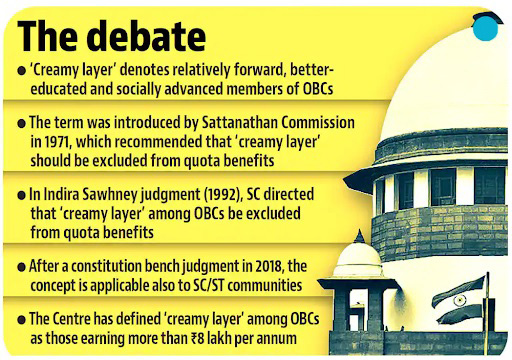Indian Polity
Criterion for Deciding Creamy Layer
- 27 Aug 2021
- 6 min read
Why in News
The Supreme Court of India recently held that the economic criterion cannot be the sole basis for deciding the creamy layer from among backward classes for the purpose of excluding it from the purview of providing reservation.
- The SC was hearing a petition challenging two notifications issued by the Haryana government sub-classifying backward classes solely on economic basis while fixing the criteria for creamy layer.
Key Points
- SC Verdict:
- Recalled the ruling in the Indra Sawhney-II case, reported in 2000. Haryana's notifications have violated the law declared in the Indra Sawhney judgment by identifying creamy layer only on the basis of income.
- The basis of exclusion of ‘creamy layer’ cannot be merely economic - the government cannot deny reservation to a person belonging to a backward community solely on the ground that he or she is rich.
- Social advancement, higher employment in government services, etc, play an equal role in deciding whether such a person belonged to the creamy layer and could be denied quota benefits.
- The SC has illustrated that ‘creamy layer’ would include “persons from backward classes who occupied posts in higher services like IAS, IPS and All India Services had reached a higher level of social advancement and economic status, and therefore, were not entitled to be treated as backward”.
- People with sufficient income who were in a position to provide employment to others should also be taken to have reached a higher social status and therefore, should be treated as outside the backward class.
- Persons from backward classes who had higher agricultural holdings or were receiving income from properties, beyond a prescribed limit, do not deserve the benefit of reservation.
- Creamy Layer:
- The creamy layer sets a threshold within which OBC reservation benefits are applicable.
- The creamy layer principle was based on the fundamental right to equality. Unless it is applied, the genuinely deserving person would not access the reservation.
- The basis of exclusion should not merely be economic, unless the economic advancement is so high that it necessarily means social advancement.
- While the income of a person can be taken as a measure of his social advancement, the limit to be prescribed should not be such as to result in taking away with one hand what is given with the other.
- The income limit must be such as to mean and signify social advancement.
- Creamy Layer as defined by the Central Government:
- The Department of Personnel and Training (DoPT) have listed out various categories of people of certain rank/status/income whose children cannot avail benefit of OBC reservation.
- Income: For those not in government, the current threshold is an income of Rs 8 lakh per year.
- The income threshold is supposed to be raised every three years.
- It was last revised in 2017 (more than three years now).
- Rank of Parents: For children of government employees, the threshold is based on their parents’ rank and not income.
- For instance, an individual is considered to fall within the creamy layer if either of his or her parents is in a constitutional post; if either parent has been directly recruited in Group-A; or if both parents are in Group-B services. There are other criteria as well.
- Income: For those not in government, the current threshold is an income of Rs 8 lakh per year.
- The Department of Personnel and Training (DoPT) have listed out various categories of people of certain rank/status/income whose children cannot avail benefit of OBC reservation.
- Constitutional Provisions Related to OBCs:
- According to the Constitution, Articles 15(4), 15(5) and 16(4) confer power on a state to identify and declare the list of SEBCs (Socially and Educationally Backward Classes). As a matter of practice, separate OBC lists are drawn up by the Centre and each state concerned.
- The Rohini Commission was constituted in October 2017 under Article 340 of the Constitution.
- It had been constituted to complete the task of sub-categorising 5000-odd castes in the central OBC.
- The 127th Constitution Amendment Bill 2021, restores the power of states to identify SEBCs, usually called OBCs.
- The amendment was necessitated after the Supreme Court, in its Maratha reservation ruling in May, upheld the 102nd Constitutional Amendment Act.
- The 102nd Constitution Amendment Act of 2018 gave constitutional status to the NCBC (National Commission for Backward Classes), and empowered the President to notify the list SEBCs for any state or union territory.
- The Amendment Bill amends Articles 342 A (clauses 1 and 2) and will introduce a new clause - 342 A (3) specifically authorising states to maintain their state list.





